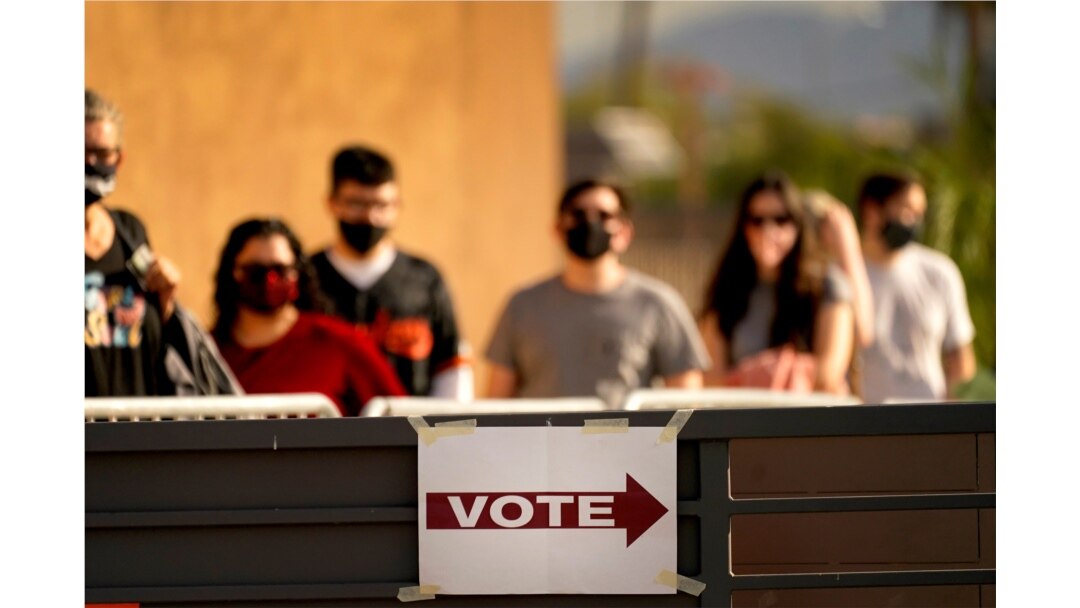Despite substantial pre-election anxiety, millions of Americans went to the polls on Tuesday to elect a new president in a process that by most accounts went smoothly.
There were few reports of voter intimidation and no major acts of violence, according to law enforcement officials and voter advocates.
With the results of a bitterly fought election campaign between President Donald Trump and Democratic challenger Joe Biden still up in the air, officials remained on alert for the possibility of unrest and potential violence.
Nevertheless, voting rights advocates said the process was largely successful and problem-free.
SEE ALSO: US Officials Confident in Secure Election, Turn Focus to DisinformationKristen Clarke, president and CEO of the Lawyers Committee for Civil Rights Under Law, said reports of voter intimidation were “more sporadic and far fewer” than her organization had anticipated.
“We were prepared to see these [voter intimidation] efforts in communities that are home to Black people and people of color in particular,” Clarke said during a press briefing around the time polls closed in most of the country.
The Lawyers' Committee fielded around 30,000 calls nationwide, mostly about ID requirements and registration, followed by electioneering and voter intimidation, Clarke said. Voter intimidation represented a handful of complaints. Moreover, there were complaints in some states of Robocalls urging voters to “Stay safe and stay home.”
“We have seen these [voter intimidation] complaints and in many instances there were lone wolf individuals and maybe groups of two, but not large groups that might otherwise have a stark, chilling effect on the electorate,” Clarke said.
Voter turnout was relatively low, in large part because most voters — more than 101 million — had already voted early or by mail.
Karen Hobert Flynn, president of Common Cause, a non-profit organization and a leader of the Election Protection Coalition, provided a similar assessment.
“I'm happy to report that overall, this has been a pretty smooth Election Day for a very challenging year,” Flynn said.

Voters stand in line outside a polling station on Election Day, in Mesa, Arizona, Nov. 3, 2020.
To be sure, there were numerous reports of run-of-the-mill voting issues across the country — from malfunctioning machines to voting places that opened late leading to lines that stretched for hours. But the type of incident that voting rights advocates most worried about — voter intimidation — was conspicuously small in number.
“We've also seen some sporadic reports of voter intimidation as well as disinformation, but so far nothing that seems out of the norm,” Flynn said.
In the run-up to Tuesday’s vote, there was great anxiety that right-wing militia groups or others would congregate around polling places, provoking violence. That led businesses around the country to board up their windows and the White House to erect a new, unscalable fence around its grounds.
But the militiamen stood down, likely because of the recent arrest of anti-government extremists on charges of plotting to kidnap Michigan Gov. Gretchen Whitmer, said Devin Burghart, president and executive director of the Institute for Research and Education on Human Rights.
“Many of them went dark or told their members to stand down,” said Burghart, who tracks online extremism.
As a result, reports of intimidation and harassment were few and far between.
In Louisiana, a man waving a Trump flag and holding a large gun showed up outside a polling station.
In North Carolina, an armed Trump supporter was arrested near a polling place after he was asked to leave.
And in Florida, two men showed up outside a precinct posing as sheriff’s deputies.
But these incidents, Clarke said, “have been very isolated and sporadic.”
Rather than posing a threat to voters, these individuals have been a “nuisance,” Clarke said.
With uncertainty hanging over the election results, Clarke cautioned that the relatively smooth voting process may turn out to be “the calm before the storm.”
“We are bracing for the possibility of seeing attempts to challenge voters on the back end as officials move beyond Election Day to the process of counting absentee ballots,” Clarke said. “So we will see if today proves to be the calm before the storm.” Protesters have converged on Washington and are planning a number of demonstrations this week.
While militia groups have refrained from swarming election places, all manner of far-right groups, from the Oath Keepers to the Boogaloo Boys, are engaging in internet chatter about post-election violence, according to Burghart.
“Many of these groups have had members who are already itching for a fight, and that creates a pretty dangerous and toxic environment moving forward if things don't resolve fairly quickly and transparently over the next day or two,” Burghart said.


